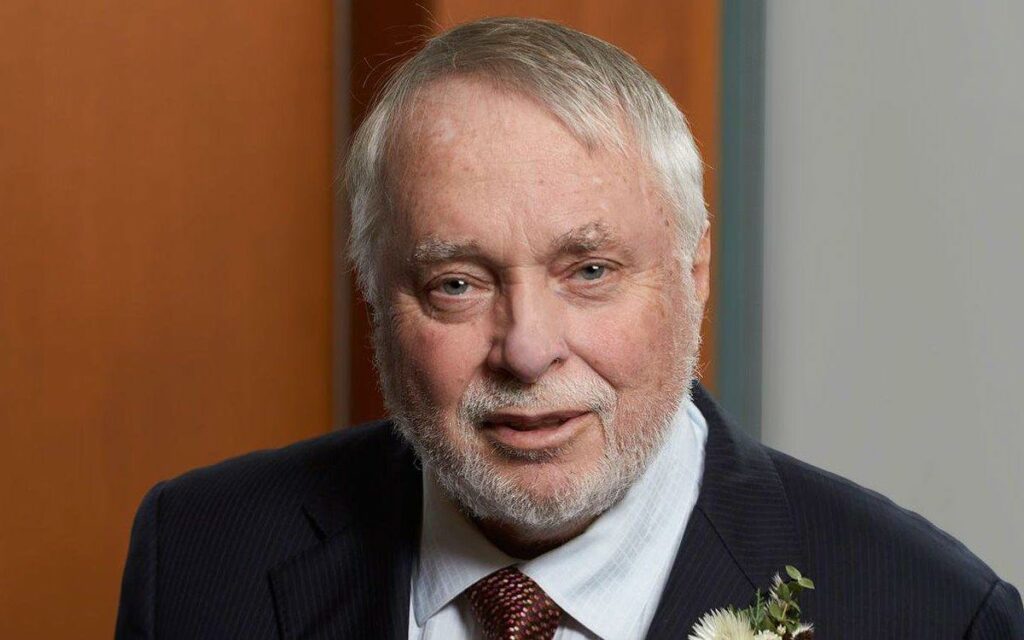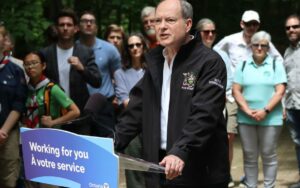
Councillor Ted McMeekin (pictured) introduced the motion. Photo credit: City of Hamilton
At a recent Hamilton City Council meeting, municipal councillors voted unanimously 16-0 in support of a universal basic income.
The motion was introduced by Councillor Ted McMeekin (Ward 15 – Flamborough East-Waterdown). McMeekin served as a Member of Provincial Parliament (MPP) under the Ontario Liberals when the Ontario Basic Income Pilot Project was created in 2017.
Cities typically do not have the capacity to implement a basic income. As such, McMeekin’s motion simply states that the City of Hamilton “calls upon the provincial and federal governments to collaborate to implement a national Guaranteed Livable Basic Income program.”
In McMeekin’s remarks in support of the motion, he said that the implementation of a basic income is not a partisan issue.
He mentioned the names of politicians from the NDP, Liberals, and Conservatives who supported a basic income over the years.
His list included Progressive Conservatives Hon. Robert Stanfield and Sen. Hugh Segal, Liberals Hon. Marc Lalone and John Munroe, and the NDP’s Tommy Douglas who have all voiced support for a basic income.
There were a number of additional action items included in the motion:
- That the City of Hamilton supports the continuing advocacy of the Basic Income Hamilton Working Group (under the auspices of the Hamilton Roundtable for Poverty Reduction).
- That Hamilton City Council direct the Office of the Mayor to write a letter to the Prime Minister, Premier, and local politicians calling for a basic income program.
- That the City of Hamilton encourage other municipalities across the country to join in advocating for a “Guaranteed Livable Basic Income.”
McMeekin’s motion comes after Doug Ford and the Ontario PCs cancelled the Ontario Basic Income Pilot Project in 2018. The pilot project was implemented in 2017 by Kathleen Wynne’s Ontario Liberal government.
The Ontario pilot project had a $150-million price tag, was meant to operate for three years, and included 4,000 individuals in Hamilton, Brantford, Lindsay, and Thunder Bay.
Under the program, individuals could receive approximately $17,000 annually, while couples could receive up to approximately $24,000 per year. Those with disabilities were able to receive an extra $6,000 annually. For those earning income, 50 per cent of any income earned annually was deducted from the basic income amount.
Despite the program being ended two years early, researchers at McMaster University released a study that looked at the one year that the program was in place.
The Ontario PCs cited the high cost of a basic income as one of the core reasons they cancelled the pilot program.
Indeed, the cost associated with basic income programs is oft-cited as one of the biggest barriers to their implementation.
A 2021 report from the Office of the Parliamentary Budget Officer estimated that a federal basic income of $17,000 per person per year would cost the government approximately $88 billion.
Nevertheless, basic income advocates eagerly await to see what the future holds.

Based in Hamilton, he reaches hundreds of thousands of people monthly on Facebook, Instagram, TikTok, and Twitter. He has been published in The Hamilton Spectator, Stoney Creek News, and Bay Observer. He has also been a segment host with Cable 14 Hamilton. In 2017, he received the Chancellor Full Tuition Scholarship from the University of Ottawa (BA, 2022). He has also received the Governor General’s Academic Medal. He formerly worked in a non-partisan role on Parliament Hill in Ottawa.


















